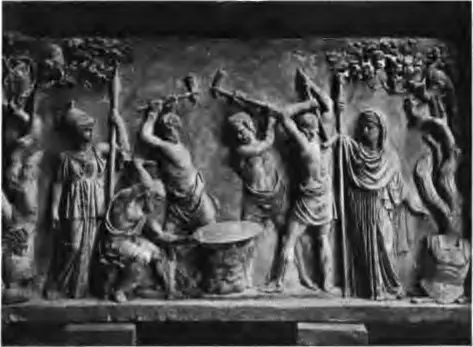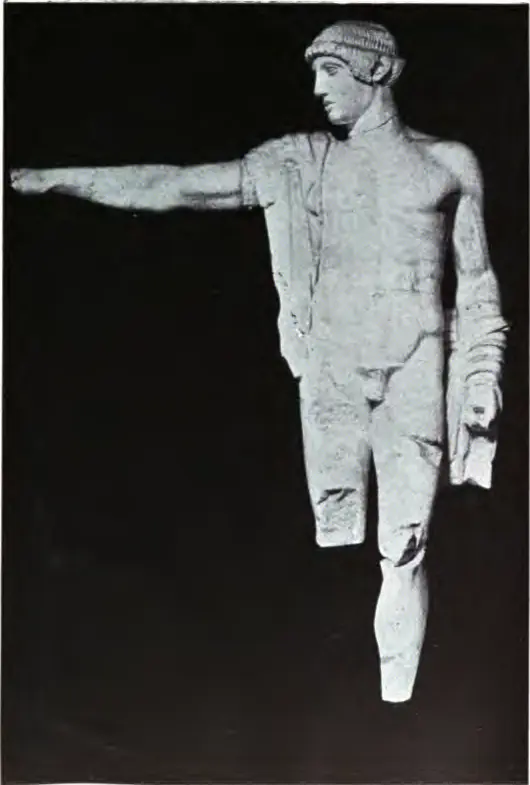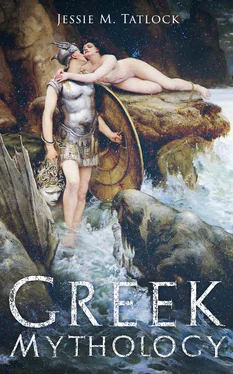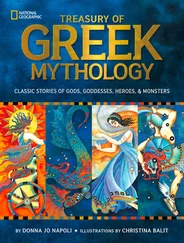In the story of A rach’ne, Athena appears as goddess of handicrafts.
Arachne was a mortal who excelled all other maidens in weaving. Her work became so famous that the very nymphs deserted their woods and streams to see it. Nor was it more the finished work that excited this admiration than the grace and skill of the maiden while she wove. One would think that she had been taught by Pallas. Yet she herself denied this and challenged the goddess to compete with her. Angry at this presumption, the goddess determined to humble her. She put on the form of a white-haired old woman, her feeble limbs supported by a stick. "Take the advice of an old woman," she said to Arachne, "you wish to be called more skilful than all mortal women; yield at least to the goddess, rash girl, and ask forgiveness for your boastful words." The maiden angrily eyed her visitor and answered rudely: "You have grown weak-minded with old age. If you have any daughters, bestow your advice upon them! I can attend to my own affairs. Why does not the goddess come herself? Why does she avoid a trial of skill?" "She has come," said the goddess, and threw aside her disguise. The nymphs and all the bystanders worshiped, only the maiden was unterrified, and obstinately insisted on the contest. The daughter of Zeus did not refuse. Arachne began to weave; she wove a web as fine as a spider's. A thousand colors were there, so finely shaded that each faded into the other until the whole was like the rainbow. Pallas wove the scene of her contest with Poseidon. There sat the twelve gods in august assembly, kingly Zeus in their midst. There was Poseidon with his trident, and Athena herself, her breast protected by the ægis, and beside her the newly-sprung olive tree. Then, that the presumptuous girl might learn by example, Athena wove the stories of mortals who had dared to compete with gods and had suffered punishment. But Arachne was not daunted. She wove into her web stories of the weaknesses and strifes of the gods, Zeus and his loves, and jealous Hera — many were the foibles there held up to derision. Then about it she wove a lovely border. Athena herself could not but wonder at the maiden's skill, but her arrogance aroused her resentment. She struck the delicate web with her shuttle, and it crumbled into bits; then she touched Arachne's forehead. A sense of her impiety rushed over the girl; she could not endure it, and hanged herself with a skein of her own silk. But Athena did not wish that so skilful a worker should die; she cut the skein and, sprinkling upon her the juice of aconite, transformed the maiden into a spider, that- through all ages she might continue to spin her matchless webs.
Minerva was an old Etruscan goddess whom the Romans worshiped as patroness of handicrafts and goddess of practical wisdom. Her festival was celebrated by guilds of artisans and physicians, and on it school-children were given a holiday. By her later identification with the Greek Pallas Athena she became known as goddess of military strategy and as protectress of cities. Jupiter, Juno, and Minerva formed a divine triad worshiped on the Capitoline Hill.
Half-brother of Athena, and son of Zeus and Hera, was He phaes’tus, the lame god of fire, the forge and metal-work, and as such, together with his great sister, a mighty helper of men in their struggle for civilization. He is thus addressed in the Homeric Hymn :
Sing, shrill Muse, of Hephæstus, renowned in craft, who with gray-eyed Athena taught goodly works to men on earth, even to men that before were wont to dwell in caves like beasts; but now, being instructed in craft by the renowned craftsman, Hephæstus, lightly the whole year through they dwell happily in their own homes. ( Homeric Hymn to Hephæstus .)
He was born lame, but two stories are told of his fall from heaven that would more than account for any such deformity. According to the one, Hera, chagrined at finding her son physically imperfect, threw him out of heaven. To avenge himself for this cruelty on his mother's part, Hephæstus cunningly constructed a golden chair and brought it as a present to Hera. When she had taken her seat upon it, invisible chains held her fast, nor could she be freed. The gods pleaded with Hephæstus in vain, until Di o ny’sus (Bacchus), the wine-god, made him drunk and so brought him to Mt. Olympus and induced him to undo his own handiwork. According to the other story Zeus, resenting his championship of his mother in one of the many quarrels between the royal pair, seized him by the foot and hurled him from Olympus.
All day I flew, and at the set of sun I fell in Lemnos, and little life was in me. ( Iliad , I. 592.)
Hephæstus made the glorious palaces of the gods on Olympus; he made the scepter of Zeus and the shield of Achilles; he helped to mold Pandora. His workshops were under the earth, where volcanoes gave an outlet to the fires of his forge. Thus the Greeks saw his home in the volcanic island of Lemnos, and the Greeks of South Italy and Sicily, under Mt. Ætna or on one of the Lipari Islands. On the latter, it was the popular belief that if the metal were left over-night near the crater, and due prayer and sacrifice made to the god, a marvelously forged sword would be found in the morning. To aid him in his work he had wonderful maidens of gold. He is described in his workshop by Homer:

Fig. 13. Hephæstus and the Cyclopes preparing the shield of Achilles.
He said, and from the anvil rose limping, a huge bulk, but under him his slender legs moved nimbly. The bellows he set away from the fire, and gathered all his gear wherewith he worked into a silver chest; and with a sponge he wiped his face and hands and sturdy neck and shaggy breast, and did on his doublet, and took a stout staff and went forth limping; but there were handmaidens of gold that moved to help their lord, the semblance of living maids. In them is understanding at their hearts, in them are voice and strength, and they have the skill of the immortal gods. ( Iliad , XVIII. 410 ff.)
Ever friendly and helpful, often a peacemaker, Hephæstus was beloved of men and gods, though his limping gait subjected him to ridicule.
Then he poured forth wine to all the gods, from right to left, ladling the sweet nectar from the bowl. And laughter unquenchable arose among the blessed gods to see Hephæstus bustling through the palace. ( Iliad , I. 597 ff.)
Hephæstus is not a favorite subject in art, but when he appears it is as a strongly-built man, his lameness only hinted at. He is dressed in a workman's short tunic and wears the workman's cap. Probably he originally represented the lightning; hence the story of his fall from heaven.
Vulcan, the fire-god, was more feared than courted in Rome, with its close-built streets, so subject to destructive fires. His worship, therefore, as originally that of the war-god Mars, was kept outside the city.

Fig. 14. Apollo, from Olympia.
Конец ознакомительного фрагмента.
Текст предоставлен ООО «ЛитРес».
Прочитайте эту книгу целиком, купив полную легальную версию на ЛитРес.
Читать дальше














